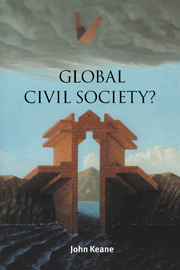Preface
Published online by Cambridge University Press: 14 January 2010
Summary
Big ideas, attempts at grasping the whole world in thought, are renowned for breeding discontent and raising future expectations. Big ideas are also well-known sources of fear and contempt among their opponents, who accuse them of oversimplified descriptions of the world, often suspecting them as well of serving as ideological alibis for power groups bent on dominating others. So controversy and opposition have been the fate of all modern versions of the big idea: the recent claim that history has ended in undisputed victory for liberal democracy and free markets, for instance, has fared no better in this respect than the earlier presumptions that socialism would win world victory, or that fascist dictatorship would purify nations and make them capable of super-human achievement.
Given this jumbled history of humbled big ideas, eyebrows may well cock at the large claim made in this slim book. Concerned with globalisation and its discontents, it puts forward the thesis that a big but modest idea with fresh potency – global civil society – is today on the rise. The book explores the historical origins of this planetary vision and analyses its present-day meanings and usages and future political potential. Not only does the argument suppose that periodic fascination with big ideas is a necessary condition of politically imagining a social order. The book also notes the unusual promiscuousness of the idea of global civil society – its remarkable ability to attract a wide variety of supporters in all four corners of the earth.
- Type
- Chapter
- Information
- Global Civil Society? , pp. xi - xivPublisher: Cambridge University PressPrint publication year: 2003

